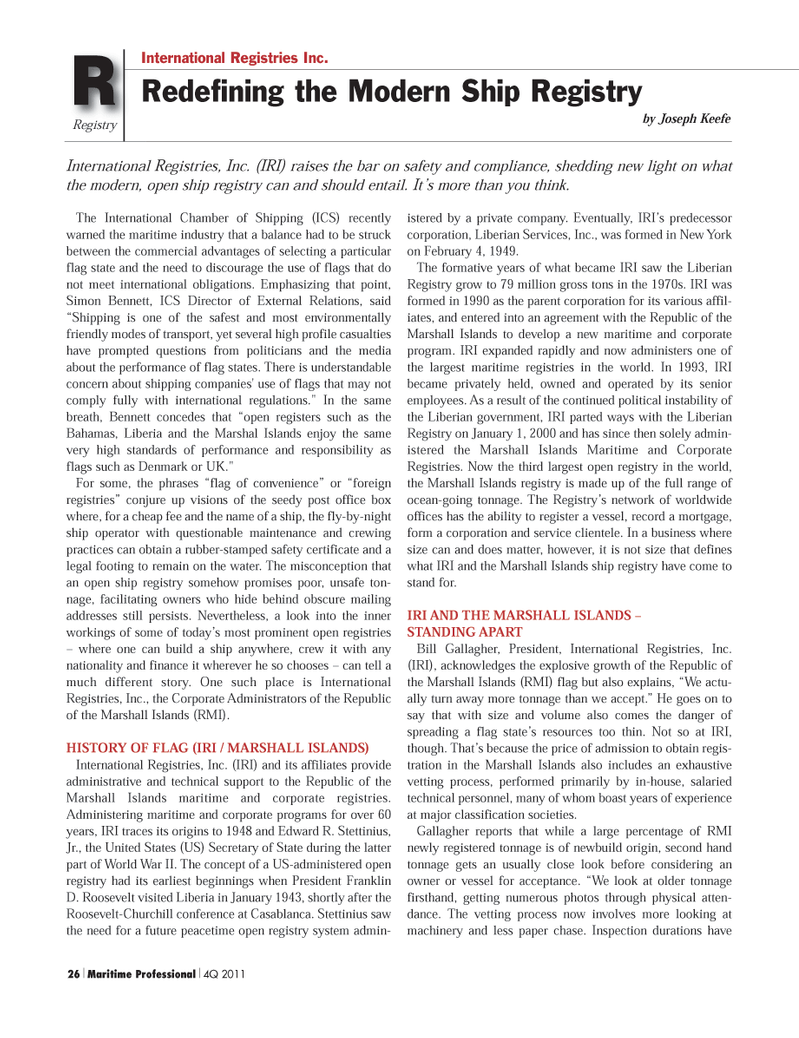
Page 26: of Maritime Logistics Professional Magazine (Q4 2011)
Classification
Read this page in Pdf, Flash or Html5 edition of Q4 2011 Maritime Logistics Professional Magazine
26 Maritime Professional 4Q 2011The International Chamber of Shipping (ICS) recentlywarned the maritime industry that a balance had to be struck between the commercial advantages of selecting a particular flag state and the need to discourage the use of flags that donot meet international obligations. Emphasizing that point,Simon Bennett, ICS Director of External Relations, said?Shipping is one of the safest and most environmentally friendly modes of transport, yet several high profile casualties have prompted questions from politicians and the media about the performance of flag states. There is understandable concern about shipping companies' use of flags that may notcomply fully with international regulations." In the same breath, Bennett concedes that ?open registers such as the Bahamas, Liberia and the Marshal Islands enjoy the same very high standards of performance and responsibility as flags such as Denmark or UK." For some, the phrases ?flag of convenience? or ?foreign registries? conjure up visions of the seedy post office box where, for a cheap fee and the name of a ship, the fly-by-nightship operator with questionable maintenance and crewing practices can obtain a rubber-stamped safety certificate and a legal footing to remain on the water. The misconception that an open ship registry somehow promises poor, unsafe ton- nage, facilitating owners who hide behind obscure mailing addresses still persists. Nevertheless, a look into the inner workings of some of today?s most prominent open registries ? where one can build a ship anywhere, crew it with any nationality and finance it wherever he so chooses ? can tell a much different story. One such place is International Registries, Inc., the Corporate Administrators of the Republic of the Marshall Islands (RMI). HISTORY OF FLAG (IRI / MARSHALL ISLANDS) International Registries, Inc. (IRI) and its affiliates provide administrative and technical support to the Republic of the Marshall Islands maritime and corporate registries. Administering maritime and corporate programs for over 60 years, IRI traces its origins to 1948 and Edward R. Stettinius, Jr., the United States (US) Secretary of State during the latter part of World War II. The concept of a US-administered open registry had its earliest beginnings when President Franklin D. Roosevelt visited Liberia in January 1943, shortly after the Roosevelt-Churchill conference at Casablanca. Stettinius saw the need for a future peacetime open registry system admin- istered by a private company. Eventually, IRI?s predecessor corporation, Liberian Services, Inc., was formed in New York on February 4, 1949.The formative years of what became IRI saw the Liberian Registry grow to 79 million gross tons in the 1970s. IRI was formed in 1990 as the parent corporation for its various affil- iates, and entered into an agreement with the Republic of theMarshall Islands to develop a new maritime and corporate program. IRI expanded rapidly and now administers one of the largest maritime registries in the world. In 1993, IRI became privately held, owned and operated by its senior employees. As a result of the continued political instability of the Liberian government, IRI parted ways with the Liberian Registry on January 1, 2000 and has since then solely admin- istered the Marshall Islands Maritime and CorporateRegistries. Now the third largest open registry in the world, the Marshall Islands registry is made up of the full range of ocean-going tonnage. The Registry?s network of worldwide offices has the ability to register a vessel, record a mortgage, form a corporation and service clientele. In a business where size can and does matter, however, it is not size that defines what IRI and the Marshall Islands ship registry have come to stand for. IRI AND THE MARSHALL ISLANDS ? STANDING APART Bill Gallagher, President, International Registries, Inc. (IRI), acknowledges the explosive growth of the Republic of the Marshall Islands (RMI) flag but also explains, ?We actu- ally turn away more tonnage than we accept.? He goes on to say that with size and volume also comes the danger of spreading a flag state?s resources too thin. Not so at IRI, though. That?s because the price of admission to obtain regis- tration in the Marshall Islands also includes an exhaustive vetting process, performed primarily by in-house, salaried technical personnel, many of whom boast years of experience at major classification societies. Gallagher reports that while a large percentage of RMI newly registered tonnage is of newbuild origin, second hand tonnage gets an usually close look before considering anowner or vessel for acceptance. ?We look at older tonnage firsthand, getting numerous photos through physical atten- dance. The vetting process now involves more looking at machinery and less paper chase. Inspection durations have RRegistry Redefining the Modern Ship Registryby Joseph Keefe International Registries Inc.International Registries, Inc. (IRI) raises the bar on safety and compliance, shedding new light on what the modern, open ship registry can and should entail. It?s more than you think. MP #4 (18-33):MP Layouts 11/8/2011 1:48 PM Page 26

 25
25

 27
27
